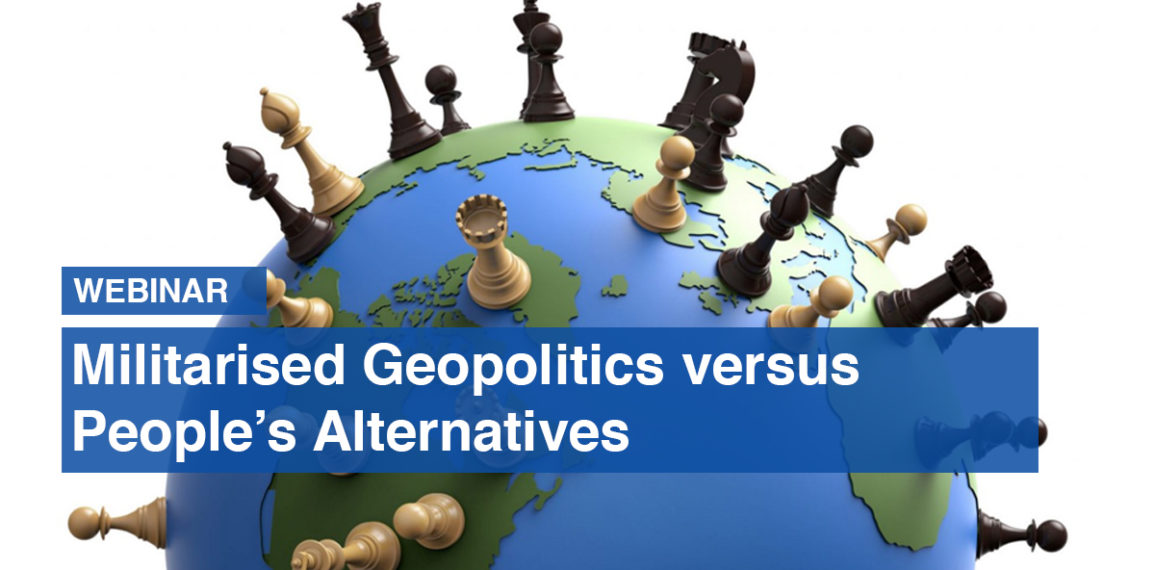Webinar: Militarised Geopolitics versus Sustainable Peoples’ Alternatives
Watch the Complete Webinar
Links to resources from the speakers
Walden Bello’s presentation on Superpower Conflict in the South China / West Philippine Sea
Taking Back Control: The Future of Public Services by Lavinia Steinfort
Ecofeminism: fueling the journey to energy democracy by Lavinia Steinfort
Concept Note
Even as the world is caught in the multiple impacts of the Covid-19 pandemic, climate and ecological crises, recession, inequality, hollowing out of democracies, suppression of dissent and minorities by elected authoritarian regimes, geopolitics and a race for hegemony between great powers, regional powers and power blocs continues. These geopolitical rivalries are a variation of past ideological/ inter-imperialist confrontations with current neoliberal rivalries and the race for hegemony and influence. These geopolitical and geo-economic contradictions range from the play between the existing great power (USA) and rising powers power (China); to resurgent power Russia; to the assertions of the EU; aspirations of Asian powers like Iran, India, Turkey; to frozen conflicts like between North and South Korea, India-Pakistan, China, etc.
These rivalries encompass the control /influence over territories, maritime routes, seas, outer space. The race for influence includes control over financial flows, communications, new technologies, scientific and cultural competition. This competition is backed by trans-national capital and corporations that is willing to backs chauvinist/racist nationalisms, and turn a blind eye to disasters in the interest of profit. This is evident in the rise of conflict embedded and failed states, migration and refugee flows, suppression of dissent, crushing of labour rights, etc. This strategic competition has deep ecological consequences, negatively impacts the climate and damages people’s lives and livelihood. Europe and Asia are at the centre of this geopolitical pull and push.
What is often hidden by dominant discourses and ignored by states and realist paradigms is the impact that such geopolitics has on people, social relations, on climate and ecology and how people and their movements shape geopolitics too for example the Brexit movement, Black Lives Matter; peoples movement in Hong Kong are consequences of new geopolitics.
The pillars of such destructive geopolitics are rooted in neoliberal capitalism that privileges capital over peoples’ lives and ecological survival; elitist, imperialist/racial narratives over social justice; national security regimes over people’s security; nuclear weapons and militarised force over peace and justice. These hegemonies (US) as well as conflicts had been simmering along, but what we have now is in a qualitatively different level of antagonisms.
In this webinar AEPF seeks to (1) analyse and question the hegemonic/militarised trends in global geo politics and contrast these with peoples’ security approaches, focussing on social and economic justice and equality. (2) Connect the disastrous impact that the world witnessed with the Covid-19 Pandemic and the inability of great, regional and small ‘powers’ to provide health and social security to their citizens. (3) Point to the false narratives that justify corporate led growth paradigms and trickle down security that prioritises increased spending on vanity projects, military industrial complexes and underfunds universal health, employment and other elements necessary for a sustainable life in peace and harmony with nature.
Panelists:
(1) Marga Ferré (Tranform!; Spain)
(2) Tariq Ali (Activist/Writer; UK, Pakistan)
(3) Walden Bello (Activist/Writer/Former MEP; Philippines)
(4) Lavinia Steinfort (Transnational Institute; The Netherlands)
Moderators:
(1) Professor Anuradha M. Chenoy (AEPF; India)
(2) Kris Vanslambrouck (AEPF; Belgium)



